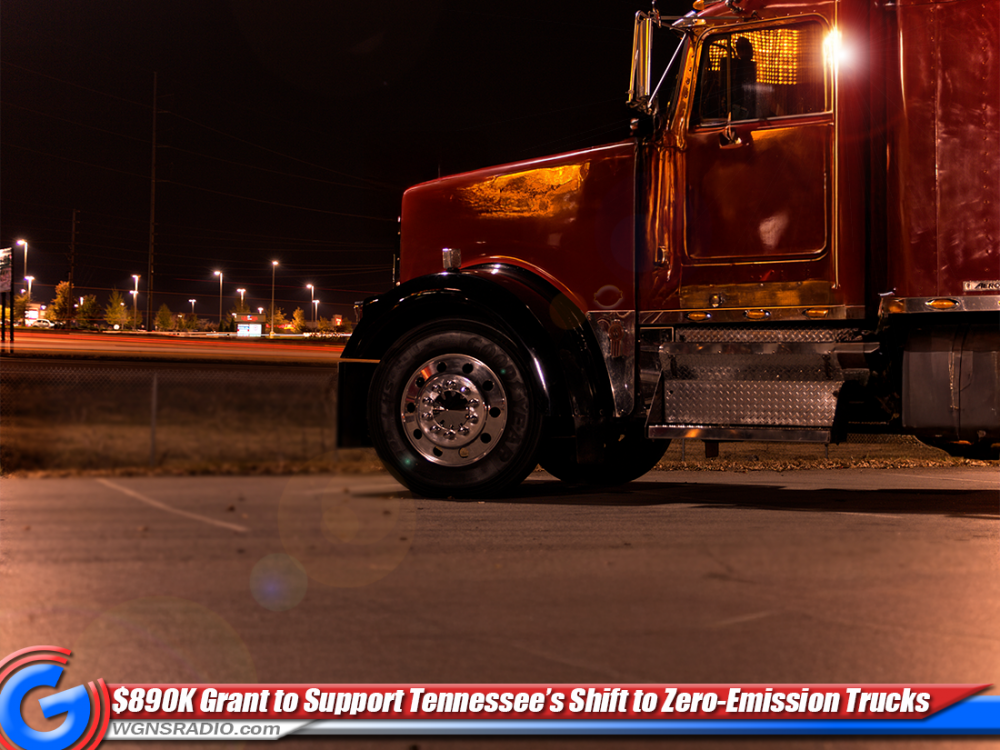TENNESSEE - As President Joe Biden prepares for his departure, multiple federal departments are announcing end-of-year initiatives. One of these, the EPA’s Clean Heavy-Duty Vehicles Grant program, created under President Biden’s Inflation Reduction Act, aims to replace heavy-duty internal combustion engine vehicles with zero-emission alternatives while expanding clean vehicle infrastructure.
The Tennessee Department of Environment and Conservation’s (TDEC) Office of Energy Programs (OEP) has been selected to receive $890,000 in funding under this program. The grant will support TDEC’s “Tennessee Truck Electrification Project,” replacing three diesel vehicles—a Class 7 dump truck, a Class 7 bucket truck, and a Class 6 box truck—with zero-emission battery-electric models. The initiative also includes installing three charging stations and certifying electricians through the Electric Vehicle Infrastructure Training Program (EVITP).
TDEC’s project is among 71 selected across the U.S., with the program distributing a total of $739.8 million to fund over 2,000 zero-emission vehicles and related infrastructure. The Tennessee project will contribute to tackling climate change, reducing air pollution, and advancing environmental justice in the state.
The initiative prioritizes disadvantaged communities impacted by air quality challenges and aligns with the Biden-Harris Administration’s National Blueprint for Transportation Decarbonization and Justice40 Initiative, which directs 40% of benefits to underserved areas. Final awards are expected to be finalized by early 2025, with implementation occurring over the next two to three years.
Learn More: “Thanks to President Biden, we are accelerating American leadership in developing clean technologies that address the impacts of climate change,” said EPA Administrator Michael S. Regan. “Together, the Clean Heavy-Duty Vehicles Grant projects announced today will slash air pollution and enhance the country’s infrastructure for cleaner transportation solutions, creating good-paying jobs along the way.”
“EPA’s Southeast Region is excited to have eight selectees across six of our states for this new funding program, which will focus on communities with poor air quality,” said acting Regional Administrator Jeaneanne Gettle. “With at least $400 million of this funding going to communities located in areas designated nonattainment for having air pollution levels persistently exceeding the National Ambient Air Quality Standards, the selected projects will focus on improvements to air quality in areas where it is most needed and be very impactful.”
Across the nation, over 3 million Class 6 and Class 7 vehicles are currently in use, spanning a wide variety of vehicle types and vocations. Many of these are older vehicles that emit higher levels of harmful pollutants like nitrogen oxides, fine particulate matter, and greenhouse gases than newer vehicles. This pollution is associated with respiratory and cardiovascular disease, among other serious health problems. Children, older adults, those with preexisting cardiopulmonary disease, and those of lower socioeconomic status are particularly vulnerable to these health impacts. Cleaning up pollution from heavy-duty vehicles helps protect the health of 72 million people living near truck freight routes in America.
EPA’s Clean Heavy-Duty Vehicles Grant Program will accelerate the adoption and deployment of eligible Class 6 and 7 zero-emission vehicles. Vehicles eligible for replacement include older vehicles powered by internal combustion engines that pre-date recent EPA emission standards.
In total, EPA announced 71 applicants across 28 states, 3 Tribal Nations, and 1 territory have been selected to receive $739,841,515 to assist in the purchase of over 2,000 zero-emission vehicles through its first-ever Clean Heavy-Duty Vehicles Grant Program.
Proposed replacement vehicles include battery-electric box trucks, cargo trucks, emergency vehicles, refuse/recycling haulers, school buses, shuttle buses, step vans, transit buses, utility vehicles, and other vocational vehicles, as well as a small number of hydrogen fuel cell transit buses. In addition, the Clean Heavy-Duty Vehicles Grant Program also funds zero-emission vehicle fueling infrastructure (e.g., electric vehicle charging stations), as well as workforce development and training. These investments support the implementation of the Biden-Harris Administration’s National Blueprint for Transportation Decarbonization and the National Zero-Emission Freight Corridor Strategy.
Roughly 70% of the funding awarded today will support the purchase of clean school buses, helping provide clean air for children on their ride to school. These awards complement EPA’s Clean School Bus program through the President’s Bipartisan Infrastructure Law, which has awarded nearly $3 billion for nearly 9,000 clean school buses to date.
The Clean Heavy-Duty Vehicles Grant Program advances President Biden’s Justice40 Initiative, which aims to deliver 40% of the overall benefits of certain federal investments to disadvantaged communities that are marginalized by underinvestment and overburdened by pollution.
EPA prioritized disadvantaged communities facing air quality challenges, including nonattainment with EPA’s fine particulate matter (PM2.5) and ozone (O3) National Ambient Air Quality Standards (NAAQS) or high levels of ambient diesel PM. Applications were evaluated on engagement with affected communities, especially local residents, to ensure their meaningful participation with respect to the design, planning, and performance of the project. Approximately $523 million of the funds announced today will be used to fund projects serving communities located in areas in nonattainment with the NAAQS.
In addition to the funding for the replacement of existing internal combustion engine Class 6 and 7 heavy-duty vehicles with eligible Class 6 and 7 zero-emission vehicles, funding may also be used to support zero-emission vehicle adoption and deployment by providing:
- Zero-emission vehicle refueling infrastructure.
- Workforce development and training.
- Project implementation costs.
EPA will work with selected applicants over the coming weeks to finalize awards. EPA currently anticipates finalizing awards in early calendar year 2025 once all legal and administrative requirements are satisfied. Project implementation will occur over the next two to three years depending on the scope of each project.
Additional Information: Clean Heavy-Duty Vehicles Grant Program webpage





